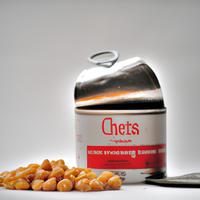
1 serving (120 grams) contains 134 calories, 7.3 grams of protein, 2.1 grams of fat, and 22.5 grams of carbohydrates.

Log this food in SnapCalorie

Nutrition Information
Calories |
268.0 | ||
|---|---|---|---|
% Daily Value* |
|||
| Total Fat | 4.2 g | 5% | |
| Saturated Fat | 0.4 g | 2% | |
| Polyunsaturated Fat | 0 g | ||
| Cholesterol | 0 mg | 0% | |
| Sodium | 560.0 mg | 24% | |
| Total Carbohydrates | 45 g | 16% | |
| Dietary Fiber | 12.4 g | 44% | |
| Sugars | 8.0 g | ||
| protein | 14.6 g | 29% | |
| Vitamin D | 0 mcg | 0% | |
| Calcium | 80.0 mg | 6% | |
| Iron | 4.8 mg | 26% | |
| Potassium | 476.0 mg | 10% | |
* Percent Daily Values are based on a 2,000 calorie diet. Your daily values may be higher or lower depending on your calorie needs.
Food Attributes
Source of Calories
About Half a can of chickpeas
Half a can of chickpeas is a versatile and nutrient-rich ingredient commonly used in Middle Eastern, Mediterranean, and Indian cuisines. With origins tracing back to ancient cultivation, chickpeas are a staple in dishes like hummus, curries, and salads. Nutritionally, half a can (approximately 120 grams) provides high-quality plant-based protein, dietary fiber, and essential micronutrients including folate, iron, and magnesium. These legumes are low in saturated fat and cholesterol-free, supporting heart health and digestion while serving as a filling, energy-sustaining food. They have a moderate glycemic index, making them suitable for blood sugar control, though individuals watching their sodium intake should choose no-salt-added varieties or rinse canned chickpeas before use. Whether blended, roasted, or cooked into stews, half a can of chickpeas delivers flavorful nutrition that fits into vegetarian, vegan, and omnivorous diets alike, enhancing meals with its mild nuttiness and creamy texture.



